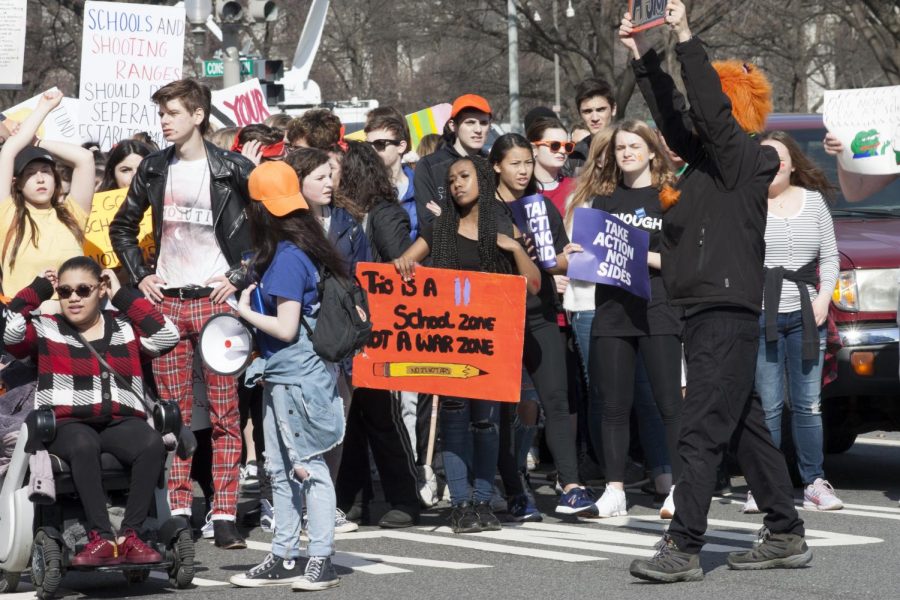When Congress Does Nothing, Talk to Their Supervisor
Some studnets have questioned whether or not protests over the last two years have been effective in achieving goals of changing national gun laws or the national discourse.
April 11, 2019
Just weeks after last year’s shooting at Marjory Stoneman Douglas high school, students from across the country faced the Capitol building, holding signs and giving speeches asking Congress for comprehensive gun legislation hoping that there would never be another school shooting in our country. Now, one year and another rally have passed and we know that the response to the 17 lost lives was an abundance of inaction; the response to the student voice— resounding silence.
Instead of protesting and trying to change Republican lawmakers’ minds, gun control activists should focus on convincing everyday Republicans who support universal background checks to come out in favor of HR8, a federal background check bill which recently passed the House of Representatives.
Moco for Change, a local gun activist group, made HR8 the focus of its second annual rally March 14 and plans to maintain political pressure on lawmakers in support of the proposed changes which close the gun show and private gun sale loopholes.
Last year’s protests yielded no returns, mainly because the protests themselves were geared toward lawmakers whose opinions were unlikely to change.
“Protests and rallies are just optics. Protests don’t do much of anything; not in this realm. I mean you look at the million man march— what did it accomplish? Nothing. You look at the walkouts that were done nationwide over the Parkland shooting— what did those accomplish? Nothing,” said Charles Smith, professor of Political Science with a specialty in gun reform policy at Ohio State University.
For HR8 and S42’s Senate counterpart to pass, Democrats need Republican support. As it stands, the Republican-controlled Senate is unlikely to pass these measures.
“Practically speaking, the landscape has not changed for the prospect of enacting federal gun control … In the Senate they don’t have the 60 [veto override] votes that they need, and there is a pro-Second Amendment president in the White House,” National Rifle Association (NRA) spokesperson Jennifer Baker said in a January interview with NPR.
Though protests don’t change minds, they act as a rallying cry to the people already connected to a movement. Gun control measures such as limiting magazine capacity and banning semi automatic weapons are opposed by many gun owners. However, expansions of Federal Background Checks like those suggested in HR8 and S42 have far more support across the political spectrum according to polling done in March of 2018 by NPR. Universal background checks are supported by over 90 percent of Americans according to a January 8 Washington Post Article. That substantial base has the power to unseat any lawmakers who do not vote for HR8 and S42. That base has simply not been energized yet.
Many Republican politicians have the NRA’s money behind their decisions, Smith said.
However, the voters who put those politicians into office have no economic reason to oppose HR8. Therefore, protestors can use techniques such as reframing the debate to better reflect the values of patriotism and loyalty to convince them to be more vocal in their support of HR8. This can be a very effective persuasive technique according to a 2015 study published in the Personality and Social Psychology Bulletin.
By using the stage of their rallies to gear their style of arguing to Republican voters and get them to be actively engaged in the movement to convince lawmakers to pass HR8 and S42, protestors can indirectly apply political pressure on pro-gun legislators and create a movement whose support outweighs the benefits of staying aligned with the NRA.
The students behind organizing the rally believe that their current approach has had and will continue to have a substantial effect.
“I think we just need to show more support. We need to write letters to our Congressmen and to our Senators. We need to lobby to certain Senators,” senior and Communications Director for MoCo Students for Change, Giovanni Gutierrez said. “After last year I think HR8 and the Congressional hearing and all of these gun reform measures that are just happening were extremely influenced by March for Our Lives… We’re hoping this will have the same impact.”
While Gutierrez is correct that protests did have some effect, especially on Democrats, that there have still been no federal laws passed on this issue and few Republicans are reaching across the isle on it telegraphs that campaigning to legislators is not effective, and the approach needs to change.
Change comes through the action of the voters— not a group of students going out to protest, but all the voters: voters in blue states; voters in red states; voters who voted for Trump; and those who voted against him. The gun control activism movement can mobilize those people. They can stand at the doorsteps of the country’s most important legislative body and turn their backs to it, face the voters, and tell them that if their senators and representatives do not pass universal background checks, they are not representing the people. The protesters should make sure that those lawmakers who vote against the interests of the people won’t make laws for much longer.





